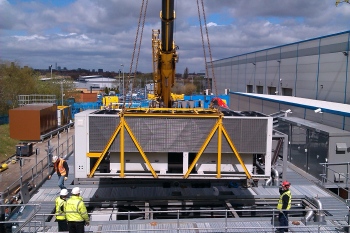The importance of being prepared

Planning for the worst can seem like a daunting task but understanding how your business and its facilities will cope in a disaster is incredibly important. Russ Baker of the hire division at ICS Cool Energy outlines why a business continuity plan is so important and the basics of putting one in place.
In terms of crisis planning, from fires to flooding there are a number of factors that could wreak havoc on your business. While the British weather can present a few surprises, the ramifications of other incidents such as power loss and system breakdowns can be mitigated. Finding ways to help your business continue to operate in a crisis forms part of the business-continuity plan so that whatever the size of the crisis, a plan can be formulated to keep the business moving.
For some, business continuity is an unknown entity — leaving them vulnerable in the event of a crisis. This compares to other businesses which have planned and mitigated for every eventuality. Wherever a business might be in the planning stages, there are options available to help make sure they are prepared, as well as some simple steps to help the building-services team.
1.Conduct a site and operations audit
Understanding where the risks lie makes it much easier to devise a plan. This covers all of your site operations and not just what you deem the big stuff. Monitoring your heating and air-conditioning are the perfect example of this — essential components within any commercial environment, but not always top of the agenda.
While there is no legal minimum or maximum temperature requirement in the workplace, the Approved Code of Practice advises that the minimum temperature should not be below 16°C and that a comfortable temperature be maintained at all times.
2.Keep a record
Once you have completed the site audit/assessment, make sure all the information is recorded, alongside any power or utility requirements, and that the information is made available to all those who require it. It’s important to consider that key personnel may not be available or not be on site during a crisis, so make sure others are informed of the plans and that detailed copies are stored in an off-site location.
Storing a contingency plan on a computer may seem like common sense, but in the event of a power outage or access issues, this will not be accessible. Should a crisis occur, information at your fingertips is key to ensuring downtime is kept to a minimum and business recovery possible, so keep hard copies of the plan throughout the building.
3.Putting a plan into place
With a site assessment complete and all details recorded, it is then possible to agree with your back-up-equipment provider on what contingency equipment is required, as well as an activation plan.
Remember to check if your supplier can activate your plan 24/7. There is no point having a contingency plan in place if the supplier can only be contacted Monday to Friday between 9 am and 5.30 pm.

Another potential option to consider is to hire back-up equipment in anticipation of system failure. For example during the summer months, extra pressure and demand on chiller equipment can come from many sources — not least cooling the work environment. For critical applications such as server rooms or even the banking industry, failure isn’t an option — so installing a back-up chiller system during summer months or expectedly busy periods could be an ideal way to mitigate against any potential risk.
4.Carry out any remedial works
All HVAC and process equipment requires electrical and mechanical connections, but access and connections can be an issue when you need a replacement quickly. Remedial works can include simple solutions such as new pipework being installed or the installation of a new power connection — but when you’re up against it and need a solution fast, even the simplest task may seem like a mountain to overcome.
This is usually something that can be easily organised through your service provider, in advance of any crisis, helping businesses to get back up and running as quickly and as swiftly as possible.
5.Consider access
Another key factor to consider is access to the site itself. A high-rise building in the centre of a city may prove difficult to access during working hours, or perhaps the building is located on a red route.
It is also important to consider where existing kit is located. For example, if the chiller is on the top of a multi-storey building, a replacement will need to be delivered by truck and loaded using a crane. This does link into the theme of remedial works quite heavily as there may be a temporary location where equipment could be positioned, including access to power; this can be resolved during the remedial planning stages.
Crucially, include in your plan not only the equipment required but also where it will be located; a designated slot in the car park, close to the building for example, may suffice. Just remember that wherever you chose, access points and any remedial works required should be identified in advance of any crisis.
Needless to say, building in a contingency plan is an important part of any business strategy, so finding the right partner is essential. Once found, this partner can help guide businesses through the site assessments, organise the remedial works and be at the other end of the phone 24/7 in the event of any breakdown or crisis. Where downtime is not an option, it really does pay to be prepared.
Russ Baker, is UK sales director of the hire division at ICS Cool Energy.







